上海高考实用英语语法复习笔记[宝典]
上海高考英语知识点归纳
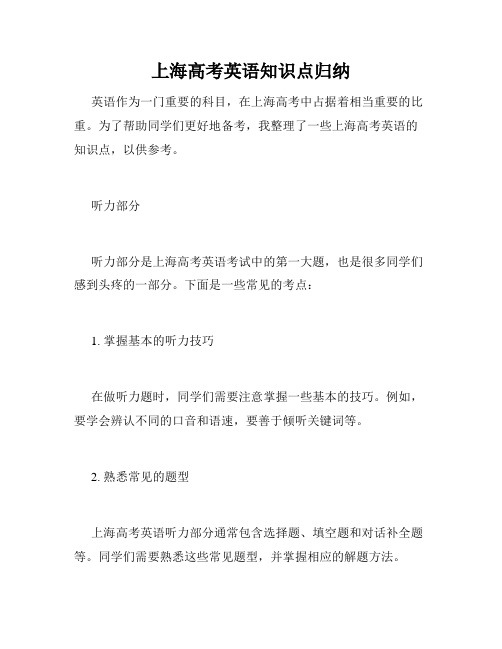
上海高考英语知识点归纳英语作为一门重要的科目,在上海高考中占据着相当重要的比重。
为了帮助同学们更好地备考,我整理了一些上海高考英语的知识点,以供参考。
听力部分听力部分是上海高考英语考试中的第一大题,也是很多同学们感到头疼的一部分。
下面是一些常见的考点:1. 掌握基本的听力技巧在做听力题时,同学们需要注意掌握一些基本的技巧。
例如,要学会辨认不同的口音和语速,要善于倾听关键词等。
2. 熟悉常见的题型上海高考英语听力部分通常包含选择题、填空题和对话补全题等。
同学们需要熟悉这些常见题型,并掌握相应的解题方法。
阅读部分阅读部分是上海高考英语考试中的第二大题,也是很多同学们觉得困难的一部分。
下面是一些常见的考点:1. 快速阅读技巧在完成阅读理解题时,同学们需要掌握一些快速阅读技巧,例如扫读和略读。
这些技巧可以帮助同学们迅速找到关键信息。
2. 掌握常见的题型上海高考英语阅读部分通常包含选择题、判断题和填空题等。
同学们需要熟悉这些常见题型,并掌握相应的解题方法。
写作部分写作部分是上海高考英语考试中的第三大题,同学们需要根据题目要求进行写作。
下面是一些常见的写作考点:1. 提高写作水平提高写作水平是写作部分的关键。
同学们需要多读英文文章,积累词汇和表达方式,同时也要多加练习写作,不断提高自己的写作能力。
2. 掌握常见的写作题型上海高考英语写作部分通常包含议论文、图表作文和书信等。
同学们需要熟悉这些常见题型,并掌握相应的写作技巧。
词汇与语法部分词汇与语法部分是上海高考英语考试中的第四大题,也是很多同学们觉得有难度的一部分。
下面是一些常见的考点:1. 扩大词汇量词汇量的扩大对于英语考试至关重要。
同学们需要通过多读多背,积累常用单词和短语,并掌握它们的用法。
2. 掌握常见的语法知识上海高考英语语法部分常涉及词性、句型和时态等。
同学们需要掌握常见的语法知识,并能够熟练地运用到写作和阅读中。
综上所述,上海高考英语知识点的归纳可以帮助同学们更好地备考,提高自己的英语水平。
上海高三英语语法知识点
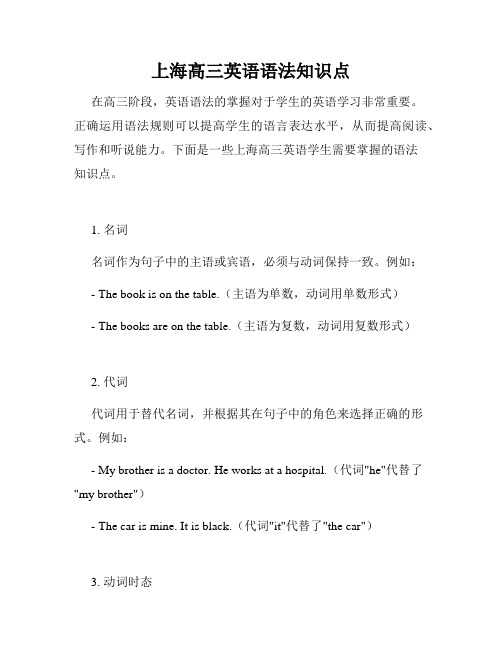
上海高三英语语法知识点在高三阶段,英语语法的掌握对于学生的英语学习非常重要。
正确运用语法规则可以提高学生的语言表达水平,从而提高阅读、写作和听说能力。
下面是一些上海高三英语学生需要掌握的语法知识点。
1. 名词名词作为句子中的主语或宾语,必须与动词保持一致。
例如:- The book is on the table.(主语为单数,动词用单数形式)- The books are on the table.(主语为复数,动词用复数形式)2. 代词代词用于替代名词,并根据其在句子中的角色来选择正确的形式。
例如:- My brother is a doctor. He works at a hospital.(代词"he"代替了"my brother")- The car is mine. It is black.(代词"it"代替了"the car")3. 动词时态动词时态用于表示动作发生的时间。
英语中常用的时态有一般现在时、一般过去时和一般将来时。
例如:- I study English every day.(一般现在时)- She watched a movie last night.(一般过去时)- We will go to the beach tomorrow.(一般将来时)4. 形容词和副词形容词用来描述名词的特征,副词则用来描述动词的方式。
形容词和副词在句子中通常位于名词或动词之前。
例如:- He is a tall man.(形容词)- She speaks English fluently.(副词)5. 连词连词用于连接两个句子或短语。
常见的连词有并列连词、从属连词和关联连词。
例如:- I like singing and dancing.(并列连词"and"连接两个动词)- He didn't come to the party because he was sick.(从属连词"because"连接两个句子)6. 句型学生需要掌握各种不同的句型,包括陈述句、疑问句、祈使句和感叹句等。
上海高三语法知识点

上海高三语法知识点Shanghai Senior Three Grammar Knowledge PointsIntroduction:Grammar is an essential aspect of language learning and plays a crucial role in effective communication. In this article, we will explore key grammar knowledge points that are important for high school seniors in Shanghai. By understanding and applying these grammar rules, students can improve their language skills and enhance their overall academic performance.1. Parts of Speech:1.1 Nouns: Nouns are words that name people, places, things, or ideas. They can be classified as common nouns, proper nouns, abstract nouns, or collective nouns. Understanding their usage helps in constructing grammatically correct sentences.1.2 Pronouns: Pronouns are used as substitutes for nouns. They can be personal pronouns (e.g., I, you, he, she), possessive pronouns (e.g., mine, yours, his, hers), demonstrative pronouns (e.g., this, that, these, those), or relative pronouns (e.g., who, whom, which, that).1.3 Verbs: Verbs are action words and indicate what the subject of the sentence does. They can be categorized as transitive or intransitive verbs. Students should pay attention to verb conjugation, tenses, and correct usage of auxiliary verbs.1.4 Adjectives: Adjectives describe or modify nouns and pronouns. They provide additional information about the noun or pronoun in terms of size, color, shape, etc. It is important to understand the correct placement of adjectives in a sentence.1.5 Adverbs: Adverbs modify verbs, adjectives, or other adverbs. They express time, place, manner, degree, or frequency. It is crucial to use adverbs correctly when conveying precise information in a sentence.2. Sentence Structure:2.1 Subject and Predicate: A sentence consists of a subject, which represents the main topic, and a predicate, which expresses the action or state of the subject. Students should understand how to identify the subject and ensure subject-verb agreement.2.2 Clauses: Clauses are groups of words that contain a subject anda verb. They can be independent clauses (expressing a completethought) or dependent clauses (not expressing a complete thought). Correct placement and punctuation of clauses help in constructing coherent sentences.2.3 Sentence Types: Understanding the differences between declarative, interrogative, imperative, and exclamatory sentences allows students to convey their intended meaning accurately.3. Punctuation:3.1 Comma Usage: Proper comma usage is crucial in separating items in a list, joining independent clauses, setting off non-essential information, and indicating direct speech.3.2 Apostrophes: Apostrophes are used to indicate possession or contraction. It is important to know when and where to use apostrophes correctly in order to avoid confusion and maintain grammatical accuracy.3.3 Quotation Marks: Quotation marks are used to indicate direct speech or to enclose titles of short works, such as articles or poems. Students should understand when and how to use quotation marks appropriately.Conclusion:Mastering grammar knowledge points is a fundamental step in becoming proficient in the English language. By understanding the parts of speech, sentence structure, and punctuation rules, high school seniors in Shanghai can enhance their writing and speaking abilities. Regular practice and application of these grammar rules will undoubtedly lead to improved language skills and academic success.。
上海高考英语整理知识点讲义
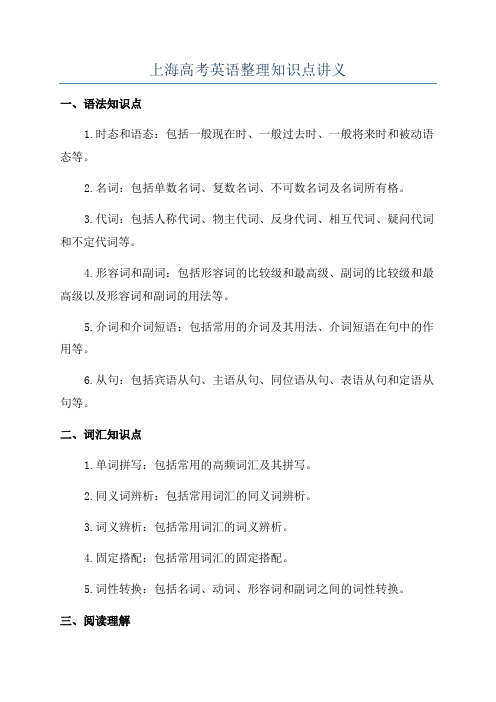
上海高考英语整理知识点讲义一、语法知识点1.时态和语态:包括一般现在时、一般过去时、一般将来时和被动语态等。
2.名词:包括单数名词、复数名词、不可数名词及名词所有格。
3.代词:包括人称代词、物主代词、反身代词、相互代词、疑问代词和不定代词等。
4.形容词和副词:包括形容词的比较级和最高级、副词的比较级和最高级以及形容词和副词的用法等。
5.介词和介词短语:包括常用的介词及其用法、介词短语在句中的作用等。
6.从句:包括宾语从句、主语从句、同位语从句、表语从句和定语从句等。
二、词汇知识点1.单词拼写:包括常用的高频词汇及其拼写。
2.同义词辨析:包括常用词汇的同义词辨析。
3.词义辨析:包括常用词汇的词义辨析。
4.固定搭配:包括常用词汇的固定搭配。
5.词性转换:包括名词、动词、形容词和副词之间的词性转换。
三、阅读理解1.主旨大意题:通过理解文章的中心思想和主要观点,回答文章的主旨大意。
2.细节理解题:通过理解文章中的细节信息,回答具体问题。
3.推理判断题:通过理解文章的意思和文中暗示的信息,进行推理判断。
4.修辞手法题:通过理解文章中的修辞手法,回答有关修辞手法的问题。
5.行文结构题:通过理解文章的行文结构,回答有关文章结构的问题。
四、完形填空1.上下文逻辑关系:通过理解文章上下文的逻辑关系,选择正确的词语或短语。
2.词义推断:通过上下文的暗示,推测出词语的正确意思。
3.句子解释:通过理解句子的语法结构和语境,选择合适的解释。
4.段落标题:通过理解段落的主题和内容,选择合适的段落标题。
五、写作技巧1.作文结构:包括主题句、扩展句和结论句等,讲述一个有机结构的故事。
2.连词使用:通过使用适当的连词,使语言表达更加连贯。
3.句型变化:通过改变句子的结构和语序,使文章更加丰富多样。
4.词汇运用:通过运用丰富的词汇,使文章更加生动有趣。
5.注意细节:注意文章的细节描述和逻辑关系,使文章更加完整和准确。
上海高考英语知识点汇总
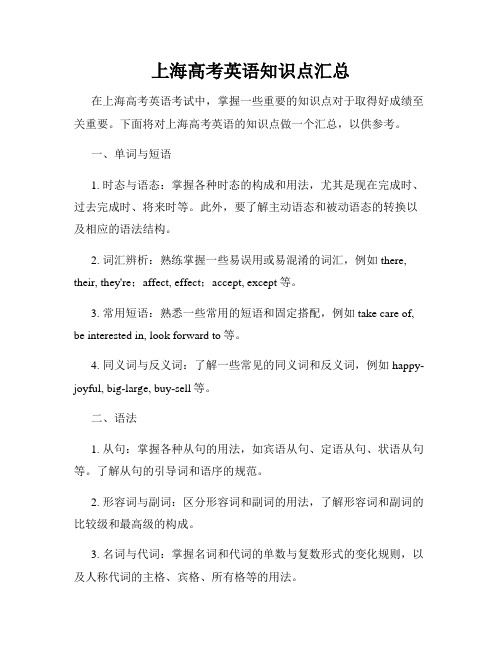
上海高考英语知识点汇总在上海高考英语考试中,掌握一些重要的知识点对于取得好成绩至关重要。
下面将对上海高考英语的知识点做一个汇总,以供参考。
一、单词与短语1. 时态与语态:掌握各种时态的构成和用法,尤其是现在完成时、过去完成时、将来时等。
此外,要了解主动语态和被动语态的转换以及相应的语法结构。
2. 词汇辨析:熟练掌握一些易误用或易混淆的词汇,例如there, their, they're;affect, effect;accept, except等。
3. 常用短语:熟悉一些常用的短语和固定搭配,例如take care of, be interested in, look forward to等。
4. 同义词与反义词:了解一些常见的同义词和反义词,例如happy-joyful, big-large, buy-sell等。
二、语法1. 从句:掌握各种从句的用法,如宾语从句、定语从句、状语从句等。
了解从句的引导词和语序的规范。
2. 形容词与副词:区分形容词和副词的用法,了解形容词和副词的比较级和最高级的构成。
3. 名词与代词:掌握名词和代词的单数与复数形式的变化规则,以及人称代词的主格、宾格、所有格等的用法。
4. 冠词与介词:了解冠词和介词的用法和常见搭配。
三、阅读理解1. 长篇阅读:学会迅速抓住主题思想、段落大意、作者观点等,同时注意识别细节信息。
2. 短文阅读:能够准确理解短文的题目要求,筛选关键词,找出正确答案。
3. 表格填空:掌握提取信息、归纳和总结的技巧,准确填写答案。
四、写作1. 作文结构:了解作文的基本结构,包括引入段、主体段和结尾段,合理使用段落分隔符。
2. 时态与语态:正确运用各种时态和语态,使文章行文连贯。
3. 表达能力:丰富自己的词汇量,合理运用各种句式和语法结构,以提高表达能力。
五、听力1. 短对话理解:通过熟悉日常用语和常见场景,提高听力理解能力。
2. 长对话与短文听力:掌握提取关键信息和主旨要点的技巧,培养听力记笔记的能力。
沪版英语高考知识点归纳总结
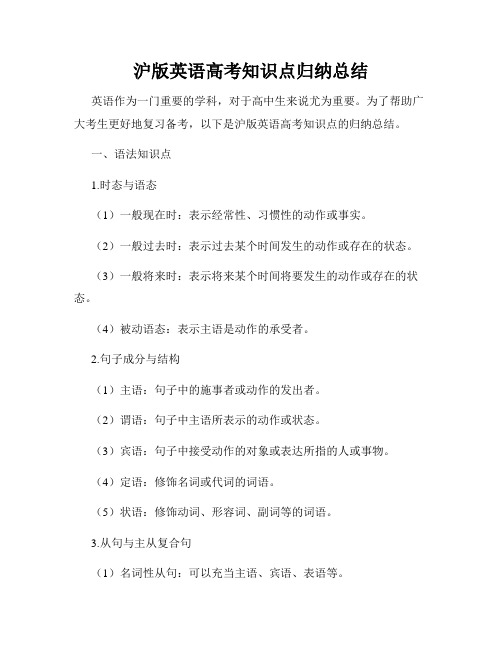
沪版英语高考知识点归纳总结英语作为一门重要的学科,对于高中生来说尤为重要。
为了帮助广大考生更好地复习备考,以下是沪版英语高考知识点的归纳总结。
一、语法知识点1.时态与语态(1)一般现在时:表示经常性、习惯性的动作或事实。
(2)一般过去时:表示过去某个时间发生的动作或存在的状态。
(3)一般将来时:表示将来某个时间将要发生的动作或存在的状态。
(4)被动语态:表示主语是动作的承受者。
2.句子成分与结构(1)主语:句子中的施事者或动作的发出者。
(2)谓语:句子中主语所表示的动作或状态。
(3)宾语:句子中接受动作的对象或表达所指的人或事物。
(4)定语:修饰名词或代词的词语。
(5)状语:修饰动词、形容词、副词等的词语。
3.从句与主从复合句(1)名词性从句:可以充当主语、宾语、表语等。
(2)定语从句:修饰名词或代词的从句。
(3)状语从句:修饰动词、形容词或副词的从句。
二、词汇与短语1.常用词汇(1)动词:包括实义动词和情态动词。
(2)名词:包括可数名词和不可数名词。
(3)形容词:用于修饰名词。
(4)副词:用于修饰动词、形容词或其他副词。
2.常用短语(1)介词短语:用于表示时间、地点、原因等。
(2)固定搭配:由两个或更多个词语组成,具有固定意义。
三、阅读理解1.题目类型与解题技巧(1)主旨大意题:通过理解文章主题和段落大意进行判断。
(2)细节理解题:根据文章中的具体信息进行解答。
(3)推理判断题:通过分析文章中的隐含信息进行推理。
2.阅读策略与技巧(1)快速阅读:快速浏览文章,了解整体内容和结构。
(2)略读:根据题目要求,迅速找到相关信息进行解题。
(3)精读:仔细阅读和理解文章,把握文章细节和作者观点。
四、写作技巧与范文1.写作类型与要求(1)记叙文:叙述一个故事或经历,包括开头、中间和结尾。
(2)说明文:对某个事物或概念进行解释或描述。
(3)议论文:对某个问题或观点进行辩论或讨论。
2.写作技巧(1)合理运用词汇和短语,使文章内容更加丰富多样。
2007-2011上海高考英语语法考点归纳
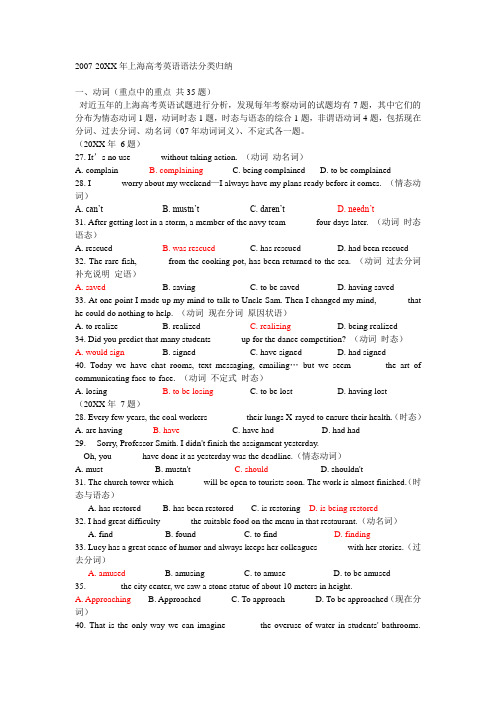
2007-20XX年上海高考英语语法分类归纳一、动词(重点中的重点共35题)对近五年的上海高考英语试题进行分析,发现每年考察动词的试题均有7题,其中它们的分布为情态动词1题,动词时态1题,时态与语态的综合1题,非谓语动词4题,包括现在分词、过去分词、动名词(07年动词词义)、不定式各一题。
(20XX年6题)27. It’s no use ______ without taking action. (动词动名词)A. complainB. complainingC. being complainedD. to be complained28. I ______ worry about my weekend—I always have my plans ready before it comes. (情态动词)A. can’tB. mustn’tC. daren’tD. needn’t31. After getting lost in a storm, a member of the navy team ______ four days later. (动词时态语态)A. rescuedB. was rescuedC. has rescuedD. had been rescued32. The rare fish, ______ from the cooking pot, has been returned to the sea. (动词过去分词补充说明定语)A. savedB. savingC. to be savedD. having saved33. At one point I made up my mind to talk to Uncle Sam. Then I changed my mind, ______ that he could do nothing to help. (动词现在分词原因状语)A. to realizeB. realizedC. realizingD. being realized34. Did you predict that many students ______ up for the dance competition? (动词时态)A. would signB. signedC. have signedD. had signed40. Today we have chat rooms, text messaging, emailing…but we seem ______ the art of communicating face-to-face. (动词不定式时态)A. losingB. to be losingC. to be lostD. having lost(20XX年7题)28. Every few years, the coal workers their lungs X-rayed to ensure their health.(时态)A. are havingB. haveC. have hadD. had had29. ---Sorry, Professor Smith. I didn't finish the assignment yesterday.---Oh, you have done it as yesterday was the deadline.(情态动词)A. mustB. mustn'tC. shouldD. shouldn't31. The church tower which will be open to tourists soon. The work is almost finished.(时态与语态)A. has restoredB. has been restoredC. is restoringD. is being restored32. I had great difficulty the suitable food on the menu in that restaurant.(动名词)A. findB. foundC. to findD. finding33. Lucy has a great sense of humor and always keeps her colleagues with her stories.(过去分词)A. amusedB. amusingC. to amuseD. to be amused35. the city center, we saw a stone statue of about 10 meters in height.A. ApproachingB. ApproachedC. To approachD. To be approached(现在分词)40. That is the only way we can imagine the overuse of water in students' bathrooms.(不定式)A. reducingB. to reduceC. reducedD. reduce(7题)27. It ______ have been Tom that parked the car here, as he is the only one with a car. (情态动词)A. mayB. canC. mustD. should29. Mary went to the box office at lunch time, but all the tickets ______ out. (时态)A. would sellB. had soldC. have soldD. was selling31. A small plane crashed into a hillside five miles east of the city, _____ all four people on board. (现在分词)A. killedB. killingC. killsD. to kill33. With the government’s aid, those ______ by the earthquake have moved to the new settlements. (过去分词)A. affectB. affectingC. affectedD. were affected35. Bill suggested ______ a meeting on what to do for the Shanghai Expo during the vacation. (动名词)A. having heldB. to holdC. holdingD. hold36. During the period of recent terrorist activities, people _______ not to touch any unattended bag. (时态与语态)A. had always been warnedB. were always being warnedC. are always warningD. always warned39. David threatened ______ his neighbor to the police if the damages were not paid. (不定式)A. to be reportedB. reportingC. to reportD. having reported(7题)28. — Do you know if Terry will go camping this weekend?—Terry? Never! She ______tents and fresh air! (时态)A. has hatedB. hatedC. will hateD. hates29. According to the air traffic rules, you ______switch off your mobile phone before bearding. (情态动词)A. mayB. canC. wouldD. should30. My sister, an inexperienced rider, was found sitting on the bicycle ______to balance it.(现在分词短语表伴随状况)A. having triedB. tryingC. to tryD. tried32. In recent years many football clubs ______as business to make a profit. (时态与语态)A. have runB. have been run C had been run D. will run33. If there's a lot of work______, I'm happy to just keep on until it is finished. (不定式作后置定语)A. to doB. to be doingC. doneD. doing35. Something as simple as ______some cold water may clear your mind and relieve pressure. (动名词短语作主语)A. to drinkB. drinking C to be drinking D. drunk37. Ideally ______for Broadway theatres and Firth Avenue, the New York Park hotel is a favourite with many guests. (过去分词短语作原因状语)A. locatingB. being locatedC. having been locatedD. Located(7题)28. --- Did you tidy your room?--- No, I was going to tidy my room but I _____ visitors. (动词时态)A. hadB. haveC. have hadD. will have29. --- Guess what! I have got A for my term paper.--- Great! You _____ read widely and put a lot of work into it. (情态动词)A. mustB. shouldC. must haveD. should have30. With the help of high technology, more and more new substances _____ in the past years.(动词时态语态)A. discoveredB. have discoveredC. had been discoveredD. have been discovered34. After a knock at the door, the child heard his mother’s voice _____ him. (动词现在分词短语做后置定语)A. callingB. calledC. being calledD. to call35. There is nothing more I can try ______ you to stay, so I wish you good luck. (动词不定式)A. being persuadedB. persuadingC. to be persuadedD. to persuade36. The Town Hall _____ in the 1800’s was the most distinguished building at that time. (动词过去分词短语做后置定语)A. to be completedB. having been completedC. completedD. being completed41. At minus 130 C, a living cell can be _____ for a thousand years. (动词词义)A. sparedB. protectedC. preservedD. developed二、介词(共5题每年考1题)25. Graduation is a good time to thank those who have helped you ______ the tough years. (11 年时间)A. throughB. upC. withD. from25. Sean has formed the habit of jogging the tree-lined avenue for two hours every day.(10年地点)A. betweenB. alongC. belowD. with25. Four Chinese models were ______ the 14 people awarded prizes on Friday at the World Supermodel Competition.(09年范围)A. amongB. betweenC. alongD. beside25. The two sportsmen congratulated each other ______ winning the match by shaking hands.(08年搭配中的介词)A. withB. onC. inD. To25. Leaves are found on all kinds of trees, but they differ greatly _____ size and shape. (07年外观)A. onB. fromC. byD. in三、代词(共5题每年考1题)26. To stay awake, he finished a cup of coffee and ordered ______. (11年不定代词)A. the otherB. otherC. the othersD. another27. If our parents do everything for us children, we won't learn to depend on . (10年反身代词)A. themselvesB. themC. usD. ourselves26. –Wow! You’ve got so many clothes.--But _____ of them are in fashion now.(09年不定代词)A. allB. bothC. neitherD. none26. — Do you want tea or coffee?—______. I really don't mind. (08年不定代词)A. NoneB. NeitherC. EitherD. All26. The mayor has offered a reward of $5000 to _____ who can capture the tiger alive or dead.(07年不定代词)A. bothB. othersC. anyoneD. another四、搭配(共6题)27. When Mom looked back on the early days of their marriage, she wondered how they had managed with ______ money. (11年so+形容词)A. so fewB. such fewC. so littleD. such little26. It took us quite a long time to get to the amusement park. It was journey.(10年复合/合成形容词)A. three hourB. a three-hoursC. a three-hourD. three hours30. In ancient times, people rarely travelled long distances and most farmers only travelled the local market. (10年句意)A. longer thanB. more thanC. as much asD. as far as28. The Great Wall is _______ tourist attraction that millions of people pour in every year.(09年语法such/so…that句型)A. so a well-knownB. a so well-knownC. such well-known aD. such a well-known27. In my view, London's not as expensive in price as Tokyo but Tokyo is ______in traffic.(08年形容词比较级)A. the most organizedB. more organizedC. so organized asD. as organized as27. Alan is a careful driver, but he drives _____ of my friends. (07年形容词比较级)A. more carefullyB. the most carefullyC. less carefullyD. the least carefully33. Pop music is such an important part of society ______ it has even influenced our language. (07年such/so…that句型)A. asB. thatC. whichD. where五、从句(重点中的重点共23题重在考查连接词)1、状语从句(共8题)36. If a lot of people say a film is not good, I won’t bother to see it, or I’ll wait ______ it comes out on DVD. (11年时间状语从句)A. whetherB. afterC. thoughD. until37. The police officers in our city work hard ______ the rest of us can live a safe life. (11年目的状语从句)A. in caseB. as ifC. in order thatD. only if34. you may have, you should gather your courage to face the challenge.(10年让步状语从句)A. However a serious problemB. What a serious problemC. However serious a problemD. What serious a problem39. our manager objects to Tom's joining the club, we shall accept him as a member. (10年条件状语从句)A. UntilB. UnlessC. IfD. After32. You can’t borrow books from the school library _______ you get your student card.(09 时间状语)A. beforeB. ifC. whileD. as31. — Are you ready for Spain?—Yes. 1 want the girls to experience that ______they are young. (08 时间状语从句)A. whileB. untilC. ifD. before40. ______well prepared you are, you still need a lot of luck in mountain climbing. (08 让步状语从句)A. HoweverB. WhateverC. No matterD. Although38. Small sailboats can easily turn over in the water ______ they are not managed carefully. (07年条件壮语从句)A. thoughB. beforeC. untilD. if2、名词性从句(共8题)35. There is clear evidence ______ the most difficult feeling of all to interpret is bodily pain. (11年表语从句)A. whatB. ifC. howD. that36. One reason for her preference for city life is she can have easy access to places like shops and restaurants.(10年表语从句)A. thatB. howC. whatD. why37. When changing lanes, a driver should use his turning signal to let other drivers know .(10年宾语从句)A. he is entering which laneB. which lane he is enteringC. is he entering which laneD. which lane is he entering37. It is not immediately clear _______ the financial crisis will soon be over.(09年主语从句)A. sinceB. whatC. whenD. whether40. As a new diplomat, he often thinks of ______ he can react more appropriately on such occasions.(09年宾语从句)A. whatB. whichC. thatD. how34. As his best friend. I can make accurate guesses about ______he will do or think. (08年宾语从句)A. whatB. whichC. whomD. that36. It has been proved ______eating vegetables in childhood helps to protect you against serious illnesses in later life. (08年主语从句)A. ifB. becauseC. whenD. That39. _____ he referred to in his article was unknown to the general reader. (07年主语从句)A. ThatB. WhatC. WhetherD. Where3、定语从句(共5题)39. You’ll find taxis waiting at the bus station ______ you can hire to reach your host family. (11年关系代词)A. whichB. whereC. whenD. as38. Wind power is an ancient source of energy we may return in the near future.(10年介词+关系代词)A. on whichB. by whichC. to whichD. from which34. Mozart’s birthplace and the house ______ he composed “The Magic Flute”are both museums now.(09年关系副词)A. whereB. whenC. thereD. which38. We went through a period ______communications were very difficult in the rural areas.(08年介词+关系代词)A. whichB. whoseC. in whichD. with which37. His movie won several awards at the film festival, ______ was beyond his wildest dream. (07年关系代词)A. whichB. thatC. whereD. it六、反意疑问句(共2题)30. It doesn’t matter if they want to come to your party, ______? (11年前否定后肯定)A. doesn’t itB. does itC. don’t theyD. do they30. Sally’s never seen a play in the Shanghai Grand Theatre, ______?(09年前否定后肯定)A. hasn’t sheB. has sheC. isn’t sheD. is she七、倒装(共4题)38. Hearing the dog barking fiercely, away ______.(09年全部倒装)A. fleeing the thiefB.was fleeing the thiefC.the thief was fleeingD. fled the thief39. So much of interest ______that most visitors simply run out of time before seeing it all.(08 部分倒装)A. offers BeijingB. Beijing offersC. does Beijing offerD. Beijing does offer31. --- How was the televised debate last night?--- Super! Rarely _____ so much media attention. (07年倒装)A. a debate attractedB. did a debate attractC .a debate did attract D. attracted a debate32. The little boy came riding full speed down the motorway on his bicycle. ______ it was! (07年不完全倒装)A. What a dangerous sceneB. What dangerous a sceneC. How a dangerous sceneD. How dangerous the scene07年语法对名词,动词,形容词,副词词义考题各一题:42. Since Tom ______ downloaded a virus into his computer, he can not open the file now. (副词词义)A. readilyB. horriblyC. accidentallyD. irregularly43. My morning ______ includes jogging in the part and reading newspapers over breakfast. (名词词义)A. drillB. actionC. regulationD. routine44. John was dismissed last week because of his ______ attitude towards his job. (形容词词义)A. informalB. casualC. determinedD. earnest。
上海高考英语整理知识点讲义

上海高考英语整理知识点讲义
一、语法知识点
1.时态
a.一般现在时:表示现在的状态或经常性的行为。
b.现在进行时:表示此刻正在进行的动作。
c.一般过去时:表示过去发生的动作。
d.过去进行时:表示过去其中一时刻正在进行的动作。
e.将来时:表示将来要发生的动作。
2.语态
a.被动语态:表示动作的承受者在句子中作主语。
b.主动语态:表示动作的执行者在句子中作主语。
3.从句
a.定语从句:用来修饰名词或代词的从句。
b.宾语从句:作动词的宾语的从句。
c.同位语从句:用来解释或说明名词或代词的从句。
d.状语从句:起状语作用的从句。
4.并列句和复合句
a.并列句:由两个或多个并列连接词连接的句子。
b.复合句:句中包含一个主句和一个或多个从句的句子。
5.词类及词性
a.名词:表示人、事物、地点、抽象概念等。
b.动词:表示动作、状态、感受等。
c.形容词:描述名词的特征或性质。
d.副词:修饰动词、形容词、其他副词等。
e.代词:代替名词的词语。
f.介词:表示方位、时间、手段等。
g.连词:连接词与词、词与句的关系。
h.数词:表示数目的词语。
i.冠词:用来限定或指示名词的词语。
二、阅读技巧
1.略读:快速阅读全文,获取文章的主题和大致内容。
2.细读:仔细阅读文章,理解具体细节和推理推断。
3.划线:将关键信息划线,有助于记忆和理解。
- 1、下载文档前请自行甄别文档内容的完整性,平台不提供额外的编辑、内容补充、找答案等附加服务。
- 2、"仅部分预览"的文档,不可在线预览部分如存在完整性等问题,可反馈申请退款(可完整预览的文档不适用该条件!)。
- 3、如文档侵犯您的权益,请联系客服反馈,我们会尽快为您处理(人工客服工作时间:9:00-18:30)。
上海高考实用英语语法笔记第一部分词法Chapter 1. 主谓一致一、概念:主谓一致是指:1)语法形式上要一致,即单复数形式与谓语要一致。
2)意义上要一致,即主语意义上的单复数要与谓语的单复数形式一致。
3)就近原则,即谓语动词的单复形式取决于最靠近它的词语,一般来说,不可数名词用动词单数,可数名词复数用动词复数。
例如:There is much water in the thermos.但当不可数名词前有表示数量的复数名词时,谓语动词用复数形式。
例如:Ten thousand tons of coal were produced last year.二、相关知识点精讲1、并列结构作主语时谓语用复数,例如:Reading and writing are very important.注:当主语由and连结时,如果表示一个单一的概念,即指同一人或同一物时,谓语动词用单数,and 此时连接的两个词前只有一个冠词。
例如:The iron and steel industry is very important to our life. 钢铁工业对我们的生活有重要意义。
2、主谓一致中的靠近原则1)当there be句型的主语是一系列事物时,谓语应与最邻近的主语保持一致。
例如:There is a pen, a knife and several books on the desk. 桌上有一支笔、一把小刀和几本书。
There are twenty boy-students and twenty-three girl-students in the class.班上有二十个男孩,二十三个女孩。
2)当either…or…与neither…nor,连接两个主语时,谓语动词与最邻近的主语保持一致。
如果句子是由here, there引导,而主语又不止一个时,谓语通常也和最邻近的主语一致。
例如:Either you or she is to go. 不是你去,就是她去。
Here is a pen, a few envelops and some paper for you. 给你笔、信封和纸。
3、谓语动词与前面的主语一致当主语有with, together with, like, except, but, no less than, as well as 等词组成的短语时,谓语动词与前面的主语部分一致。
例如:The teacher together with some students is visiting the factory. 教师和一些学生在参观工厂。
He as well as I wants to go boating.他和我想去划船。
4、谓语需用单数的情况1)代词each以及由every, some, no, any等构成的复合代词作主语时,或主语中含有each, every时, 谓语需用单数。
例如:Each of us has a tape-recorder. /There is something wrong with my watch.2)当主语是一本书或一条格言时,谓语动词常用单数。
例如:The Arabian Night is a book known to lovers of English.3)表示金钱,时间,价格或度量衡的复合名词作主语时,通常把这些名词看作一个整体,谓语一般用单数。
例如:Three weeks was allowed for making the necessary preparations. /Ten yuan is enough.5、指代意义决定谓语的单复数1)代词what, which, who, none, some, any, more, most, all等词的单复数由其指代的词的单复数决定。
2)集体名词作主语时,谓语的数要根据主语的意思来决定。
如family, audience, crew, crowd, class, company, committee等词后,谓语动词用复数形式时强调这个集体中的各个成员,用单数时强调该集体的整体。
例如:His family are music lovers.但集合名词people, police, cattle, poultry等在任何情况下都用复数形式。
例如:Are there any police around? 附近有警察吗?3)有些名词,如variety, number, population, proportion, majority等有时看作单数,有时看作复数。
例如:A number of +名词复数+复数动词:A number of books have lent out./ The majority of the students like English.The number of +名词复数+单数动词:The number of books is 53 .6、与后接名词或代词保持一致的情况1)用half of, most of, none of, heaps of, lots of, plenty of 等引起主语时,谓语动词通常与of后面的名词/代词保持一致。
例如:Most of his money is spent on books. 他大部分的钱化在书上了。
Most of the students are taking an active part in sports. 大部分学生积极参与体育运动。
2)用a portion of, a series of, a pile of, a panel of 等引起主语时,谓语动词通常用单数。
例如:A series of accidents has been reported. 媒体报道了一连串的事故。
A pile of lots was set beside the hearth. 炉边有一堆木柴。
3)如many a 或more than one 所修饰的短语作主语时,谓语动词多用单数形式。
但由more than…of 作主语时,动词应与其后的名词或代词保持一致。
例如:Many a person has read the novel.许多人读过这本书。
More than 60 percent of the students are from the city.百分之六十多的学生来自这个城市。
Chapter 2. 动词的时态一、概念:英语的实义动词有以下五种形式:(1) 动词原形:动词原形在句子中形式不变。
主要用于主语为非第三人称单数的一般现在时,情态动词之后,或根据语法规定必须用动词原形的其他情况。
(2) 一般现在时第三人称单数形式(简称现单三):主要用于主语为第三人称单数的一般现在时。
(3) 过去式:主要用于一般过去时。
(4) 现在分词:主要用于进行时态,或语法规定的其他情况。
(5) 过去分词:主要用于完成时态,或语法规定的其他情况。
不规则动词有一定的规律。
如:weep→wept, sleep→slept, sweep→swept。
为了学习的方便,人们把时间分为四个阶段:“现在、过去、将来、过去将来”。
英语动词所表示的动作在以上每个时间段中分行时、现在完成时、过去完成时、将来完成时、现在完成进行时和过去完成进行时。
其他时态很少单独使用。
下面我们把各种时态的构成和用法做一个全面的介绍。
二、相关知识点精讲:1、一般现在时(1)构成:通常以动词原形表示。
主语为第三人称单数时,用现单三形式。
1)表示经常性或习惯性的动作,常与often, usually, always, sometimes, every day, once a week, on Sundays, never 等表示经常性或习惯性的时间状语连用。
例如:I leave home for school at 7 every morning. 每天早上我七点离开家。
2)表示客观真理,客观存在,科学事实或用于强调动作的永久性、经常或反复性。
例如:The earth moves around the sun. 地球绕太阳转动。
/Shanghai lies in the east of China. 上海位于中国东部。
When Winter comes, can Spring be far behind? 冬天来了,春天还会远吗?(英国浪漫主义诗人雪莱的名句。
)Beauty is truth, truth beauty. 美即真理,真理即美。
(英国浪漫主义诗人济慈的名句。
)3)表示格言或警句。
例如:Pride goes before a fall.骄者必败。
注:此用法如果出现在宾语从句中,即使主句是过去时,从句谓语也要用一般现在时。
例如:Columbus proved that the earth is round. 哥伦布证实了地球是圆的。
4)表示现在时刻的现状、性质、状态、能力、性格、个性。
例如:Ann writes good English but does not speak well. 安英语写得不错,讲的可不行。
注:一般不用进行时的动词,它们用一般现在时表示现在进行时①表示心理状态的词:accept, agree, allow, believe, care, dislike, fear, forget, hate, know, like, love, mean, mind, need, prefer, realize, remember, respect, understand, want, wish等。
还有admit, decide, permit, promise, receive, refuse等。
②感官动词和表示状态的动词一般不用进行时。
系动词:如hear, look, notice, see, smell, sound, taste等词。
表示状态的词:be, belong to, exist, have, remain, seem, stay等词。
例如:I see him now,he’s talking to a girl. 我看见他了,他正在和一个女孩说话The warships belong to the navy and the tanks belong to the army. 军舰属于海军,坦克属于陆军。
The tea tastes fresh. 这茶味道很新鲜。
5)少数动词如go, come, leave, arrive, begin, start, be 等的一般现在时可以表示按规定、计划或安排预计要发生的事情。
